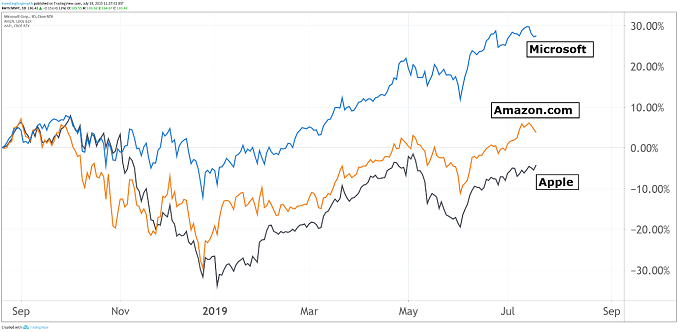Stockwatch: One of the best quality global growth stocks
This star stock is riding a tide of technology change, and a premium rating should persist a while yet.
19th July 2019 11:40
by Edmond Jackson from interactive investor
This star stock is riding a tide of technology change, and a premium rating should persist a while yet.

Latest quarterly and annual results from Microsoft (NASDAQ:MSFT) provide a modicum of relief for global investors fretting about an earnings recession ahead - President Trump having started the week with tetchy tweets about more tariffs on China, France even.
Much attention is on second-quarter US earnings generally as investors seek the truth about how trade tensions and a mature business cycle may be weighing on companies. Testing fresh highs, the US stock market has likely priced in expectations of the Federal Reserve cutting interest rates at least once this year.
Cautious mood for latest US earnings generally
The context is second-quarter US earnings coming in about 3% lower on a like-for-like basis: a FactSet report cites 88 S&P 500 firms having issued profit warnings, setting a rather cautious tone. The materials sector is expected to report the biggest like-for-like earnings drop of 16.6% after an 11.6% fall in the first quarter. This also affects sub-sectors such as chemicals, containers and packaging. Reasons are China trade-related, but we won’t see key results for another week or two.
IT is projected for an 11.9% decline after 6.6% in the first quarter. It's off to a mixed start after Netflix (NASDAQ:NFLX) plunged following the revelation it has lost customers for the first time in a decade, following price rises. However, eBay (NASDAQ:EBAY) is up on better-than expected results.

Source: TradingView Past performance is not a guide to future performance
This can be a tricky sector to draw conclusions for the wider economy. Yes, IT can be cyclical according to client companies' spending power, but when a major technology revolution drives replacement upgrades, these can become a number one priority. It’s why the technology sector is often a source of winning stocks even in a downturn.
- Stockwatch: When you should buy Amazon and Microsoft
- Chart of the week: Chance for all of us to trade Microsoft
- Big tech: Is the red-hot growth of the technology titans about to cool?
Microsoft is now surfing the wave of cloud computing
Capitalised at just over $1 trillion (£800 billion equivalent) with its stock currently at over $136 (and having headed higher in after-hours trade), Microsoft has in recent years under a new CEO positioned itself brilliantly for just such a revolution underway.
In the earnings call following these results, he extols much impressive gobbledygook, I say not to jest but make the serious point about how investor psychology is likely latching onto Microsoft – also Amazon (NASDAQ:AMZN) for its cloud computing services side, a stock I've also drawn attention to – as a relatively low risk means of exposure to cloud's growth, likely to continue a good few years.
Technology specialist fund managers will own Microsoft as a benchmark stock, generalists also because its CEO has put the company in fine shape for ongoing innovation. If judging specifics of IT competitive advantage is a step too far for most, the rational approach – if you want to back a theme – is buy market leaders like Microsoft and Amazon.
I've liked Microsoft since first drawing attention as a contrarian investment at $20.75 in May 2011, partly as a play on the global economy moving out of recession hence "at some point in the next year or two, the IT corporate spending cycle is liable to kick in." By 2013, there was already evidence of winning new products such as the "Surface" laptop-tablet hybrid I noted, and which is continuing to do well – sales up 14% in the latest quarter. In contrast with Apple (NASDAQ:AAPL), which seems trapped by a need to wow consumers/critics with every smartphone release, Microsoft seems to have to make modest tweaks to its Surface products that enjoy solid growth.
Satya Nadella's appointment as CEO from July 2014 has made my "one to watch" remark, fair puny. On day one he declared a strategic break with the past: "the world is about cloud first, mobile first", making no reference to the Windows operating system which, together with the MS Office software suite, formed most people's impression of Microsoft.
So, it has become the world's largest seller of commercial cloud services, a necessity for firms and consumers alike. No longer can a business complain it can't access data because its system is down, or an executive has lost their laptop – hence their work.
Results for the second quarter of 2019 – Microsoft's fiscal fourth quarter – have beaten expectations at both top and bottom lines: earnings of $1.31 per share versus $1.21 projected, on $33.7 billion versus $32.7 billion consensus. Remarkably – and I've mocked the concept "elephants don't gallop" along the way – Microsoft has maintained earnings beats for a full four years, showing how a big company can boom when it captures a major tide in technology change.
| Microsoft Corporation - financial year to 30 June | ||||||
|---|---|---|---|---|---|---|
| Generally Accepted Accounting Principles, and non-GAAP results | ||||||
| 2018 full-year | 2019 full-year | % change, adjusted, at constant currency | ||||
| $ millions | reported | adjusted (non GAAP) | reported | adjusted (non GAAP) | ||
| Revenue | 110,360 | 125,843 | 125,843 | 15% | ||
| Operating income | 35,058 | 42,959 | 42,959 | 24% | ||
| Net income | 30,267 | 39,240 | 36,830 | 22% | ||
| Diluted EPS ($) | 3.88 | 5.06 | 4.75 | 23% | ||
| 2018 Q4 | 2019 Q4 | % change, adjusted, at constant currency | ||||
| reported | adjusted (non GAAP) | reported | adjusted (non GAAP) | |||
| Revenue | 30,085 | 30,085 | 33,717 | 33,717 | 14% | |
| Operating income | 10,379 | 10,379 | 12,405 | 12.405 | 24% | |
| Net income | 8,873 | 8,769 | 13,187 | 10,620 | 24% | |
| Diluted EPS ($) | 1.14 | 1.13 | 1.71 | 1.37 | 24% | |
| Source: Microsoft earnings release | ||||||
Azure: a "global computer" with competitive advantages
Commercial cloud revenue is up 39% year-on-year, with the Azure business achieving $11.4 billion revenue for the quarter and $38 billion for the financial year, helping Microsoft's gross margin rise to 69% from 67%.
The CEO says: "We are building Azure as the world's computer, addressing customers’ operational sovereignty and regulatory needs. We have 54 data centre regions, more than any other provider. Azure is the only cloud that spans identity, management, security and infrastructure."
In the earnings call, he asserts a host of competitive advantages that has led to 95% of Fortune 500 companies choosing Azure - AT&T (NYSE:T) the latest this week.
Microsoft is also redefining business processes, for instance with Dynamics 365 and Power Platform "enabling any business to become a first AI-business." The marketing solutions side of LinkedIn is actually Microsoft's fastest-growing business, with new tools making it easier for marketeers to connect with LinkedIn’s 645 million members. Also, Microsoft Teams’ group chat software has overtaken Slack, with more than 13 million daily active users after just two years.
Yet traditional areas for Microsoft are also in strong shape. Windows' sales continue to benefit from businesses upgrading from version 7 to 10, helping the OEM Pro package revenues up 18% however non-Pro revenue eased 8% in the consumer segment as cheaper Google Chromebooks compete with Windows laptops (the Surface computers being premium products). Office sales are up 14% and there are 180 million active monthly Office 365 business users, also 34.8 million subscribed to the Office 365 service for consumers.
Relatively clean story to support a premium rating
When I first drew attention to Microsoft, remarkably it was on a traditional "PEG" (price/earnings-to-growth) of expected earnings percent growth higher than a prospective PE multiple under 9 times.
From the table I've included in this article, underlying growth rates approaching the mid-20% area compare with a prospective PE in the high 20's – no great premium for one of the best quality global growth stocks. So, the stock looks set to continue rising later today.
At the end of April, I drew attention both to Amazon and Microsoft as momentum plays, suggesting buy any dips. Alert momentum traders might like to tune in this afternoon for price action. More cautious investors will note Microsoft's progress before diving in, just in case the US market breaks under trade tensions, and/or Middle East tensions flare up, with Iran a resolute nuisance.
Overall, it looks like Microsoft retains good potential to maintain earnings growth while other US companies may slow. A premium rating is thus likely to persist a while yet. Hold.
Edmond Jackson is a freelance contributor and not a direct employee of interactive investor.
These articles are provided for information purposes only. Occasionally, an opinion about whether to buy or sell a specific investment may be provided by third parties. The content is not intended to be a personal recommendation to buy or sell any financial instrument or product, or to adopt any investment strategy as it is not provided based on an assessment of your investing knowledge and experience, your financial situation or your investment objectives. The value of your investments, and the income derived from them, may go down as well as up. You may not get back all the money that you invest. The investments referred to in this article may not be suitable for all investors, and if in doubt, an investor should seek advice from a qualified investment adviser.
Full performance can be found on the company or index summary page on the interactive investor website. Simply click on the company's or index name highlighted in the article.
Disclosure
We use a combination of fundamental and technical analysis in forming our view as to the valuation and prospects of an investment. Where relevant we have set out those particular matters we think are important in the above article, but further detail can be found here.
Please note that our article on this investment should not be considered to be a regular publication.
Details of all recommendations issued by ii during the previous 12-month period can be found here.
ii adheres to a strict code of conduct. Contributors may hold shares or have other interests in companies included in these portfolios, which could create a conflict of interests. Contributors intending to write about any financial instruments in which they have an interest are required to disclose such interest to ii and in the article itself. ii will at all times consider whether such interest impairs the objectivity of the recommendation.
In addition, individuals involved in the production of investment articles are subject to a personal account dealing restriction, which prevents them from placing a transaction in the specified instrument(s) for a period before and for five working days after such publication. This is to avoid personal interests conflicting with the interests of the recipients of those investment articles.